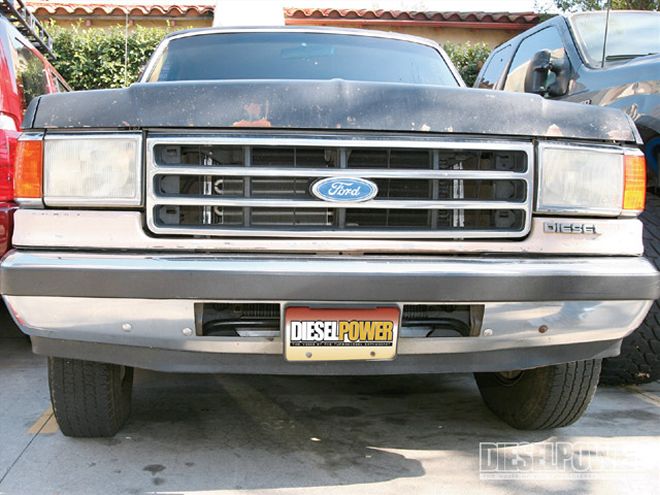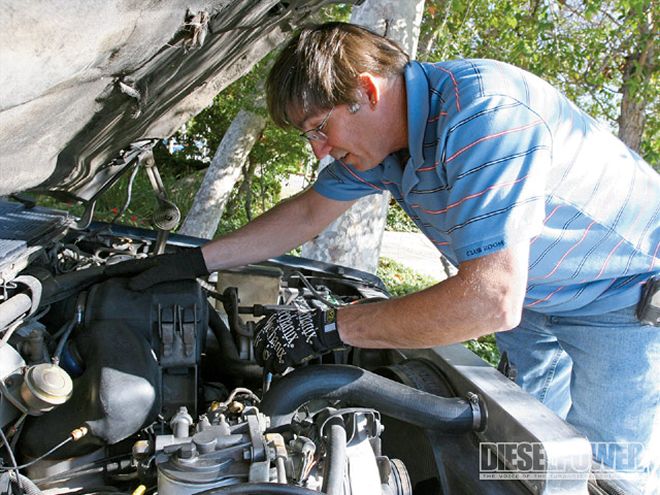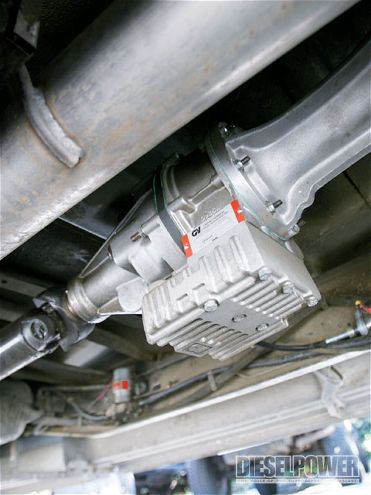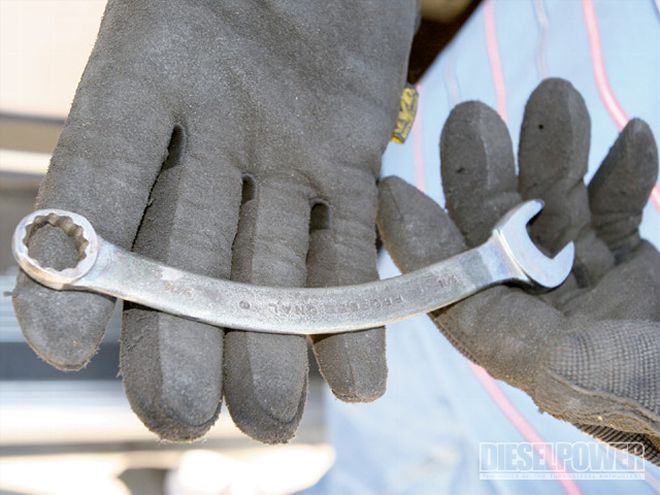
| Gary Parsons cut holes in the bumper of his '89 F-350 for two reasons. One is for increased cooling and the other is so he has a handy place to step while working on his truck.
In times of uncertainty, it is comforting to know you still have the power to make your diesel truck last forever. But when talking about forever, it's important to realize there is a big difference between getting a vehicle to last a million miles, and just keeping it running for 30 years. Believe it or not, it's much harder to make a vehicle last a couple of decades than it is to turn a million miles. The reason for this is a vehicle needs to be driven in order to keep it in operation. You have to use it, or you lose it. If you're driving it, maintaining it, even breaking and fixing it year after year-you're going to get a lot more miles out of it than if you park it in your garage. Keep in mind though, you want to make sure your truck serves you, not the other way around. Sinking a ton of time and money into an expensive lawn ornament is not the goal.
Aren't Diesels Designed to Last Forever?Engine manufacturers use probability to measure just how long they are willing to say their engines will last. Cummins says its 5.9L ISB series engines have a 350,000-mile B50 engine life. What that means is of all the engines it produces, 50 percent of them will still be running at 350,000 miles. The others will have needed major repairs. The definition of major repairs includes removing the oil pan or cylinder heads. According to International, the B (in B50) stands for bearing, since it was the bearing industry that first came up with this type of testing. The point is, every engine will need some major work at some point
It is a good idea for you too to set a mileage goal for your truck. Then once you've reached it, make sure to have an exit plan. Maybe you could give it to someone as his or her first truck, or you could keep it as a ranch or shop vehicle.
What Causes a Truck to Fail?Our trucks are a dynamic combination of simple and complex machines. They are constantly on the move and experience all kinds of different harsh climates and driving situations. When you think about it, it is amazing they last as long as they do. Here's a look at what commonly goes wrong.
1. Mechanical Problems Not even the manufacturers know exactly how long an engine and drivetrain will last before they stop spinning. There are signs to watch out for though, like excessive smoking and loss of oil pressure, or a decrease in power, which indicates an unhealthy engine. A compression test will give you an idea of how long your engine will keep going. In order to catch problems early, it is important to monitor engine coolant and exhaust temperatures as well as oil and boost pressures.
2. Body ProblemsCorrosion is a major cause for a truck's early retirement, especially if you live in areas that treat the roads with salt and other chemicals in the winter. Sadly, if your truck is exposed to these solutions regularly, there is no stopping the rust. You will only be able to slow it down. Your diesel engine might keep going, but that may not help you if the rest of the truck disappears.
3. ElectricalAvoid splicing into the wire harness whenever possible. If your electrical system is mostly good but has a few weak areas, it is a good idea to add relays to take the strain off the system. If you have an older vehicle with really bad wiring, it might be easier to ditch the factory system and make your own from scratch, or buy an aftermarket kit. Another option is switching over to a multiplex wiring system like the one from Littelfuse. The big auto manufacturers have switched to this type of system since it eliminates the need to run long power wires from switches to loads. Instead, multiple pods are powered with a single wire and each one communicates with the master module through a single communication line. No longer do you have to physically chase wires-instead you troubleshoot this system by reading the monitor screens. The newer the vehicle, the more reliant the engine is on the functioning of the electrical system. Newer engines use bundles of wires and numerous sensors to communicate with the computer. All those parts need to be working in order for the engine to run. By comparison, older mechanically injected engines don't necessarily have to have any wires going to them, which means a lot less potential for failure.
4. Loss of InterestAnother way trucks fail is when they lose the love of the owner. This happens when the vehicle is no longer able to perform what's expected of it. Your loss of interest might start by not driving it every day, and instead using another vehicle that is more comfortable. It is amazing what new seats and a more modern console can do for an old truck. Oftentimes an overblown modification takes the utility out of the ride.
5. Parts AvailabilityIt is important to plan ahead if you want your truck to last forever. This includes predicting whether or not you will be able to find parts for your truck as the years go by. Just look at how hard it is for those rebuilding classic cars. This is especially true if your truck is an oddball or was only produced for a couple of years. Think of the prices you could ask for if you had a stash of parts thirty years from now.
6. Cost of RepairsWhen faced with the dilemma of whether to junk or fix your truck, preplanning is key. For non-enthusiasts it might seem like a horrible idea to throw $3,000 at a $300 vehicle, but they do not see the potential that we see. If you have an older vehicle, it is a good idea to plan for the unexpected fix. You can think of it as a delayed payment. But what happens if your truck gets into an accident? As a general rule, don't total it. Pickup trucks, with their body-on-frame design make for an easy fix no matter how bad it might appear.
15 Rules to Make Your Truck Last Forever1. Keep it clean. Washing your truck keeps contaminants from eating through the clearcoat, paint, primer, and eventually metal. A good wash includes keeping the drains clear of debris and wiping down the doorjambs. Use a good wax at least once a year.
2. Keep it lubed. Use high quality grease on the suspension, steering, and drivetrain zerks. Use a rag to wipe off each zerk before attaching the grease gun so debris does not get pushed in. While performing routine maintenance, check for leaks and slop in drivetrain parts.
3. Invest yourself in the truck. This means taking the time to familiarize yourself with all the different systems-for example: brakes, steering, fuel delivery, suspension, and electrical. You should be able to identify all the components on your truck and be able to explain why they are there.
4. Work on the truck yourself. Or, at the very least, keep the amount of people who work on your truck to a minimum. Once you know how it works, you should learn to do the physical things that keep it working. Experience packing bearings, changing the clutch or torque converter, performing a brake job, changing the engine belts, replacing U-joints, adjusting the timing, bleeding the fuel system, and changing the filters and fluids because these are all skills you will need to have.
5. Buy the factory service manuals. They're the next best thing to knowing the engineers who designed your vehicle. Also use the factory recommended fluids and filters when they need to be changed. It won't hurt to use more expensive synthetic lubricants, but that is something the owner needs to weigh against his budget.
6. Don't be afraid to buy the specialty tools you need to service your vehicle. If you are on a budget, buy the tools as you need them, but keep in mind that like vehicle parts, the tools will also become more scarce as time goes by.
7. Be brand loyal. At a certain point specialization is needed. Since today's vehicles are so complex, it is oftentimes more effective to stick with one brand and learn its ways. Each automaker has its own philosophy on getting things done, and after working on a single type of vehicle you will begin to get inside the engineers' heads.
8. Don't let anyone else drive it. As your vehicle gets older it will develop tricks only you can figure out. Without the right amount of finesse, a person not familiar with your truck will break the tricky, delicate part.
9. Remember your truck is only as strong as its weakest link, so invest in good parts. Take the time to do the research on each product you put on your truck. Hold on to the receipts so you can keep track of your warranty and total investment.
10. Start out with the right pay load. If you need a truck to carry heavy loads-get a 1-ton. If you know you will only use it occasionally-get a 3/4-ton. If you don't think you will ever use your truck as a truck-get a 1/2-ton.
11. Stockpile parts you know you will need. If you've planned to pass down your truck as an heirloom, your children will appreciate a stockpile of parts to go along with it. Manufacturers only make a certain amount of parts, and once they're gone, they are gone for good.
12. Buy parts with a lifetime warranty. Sometimes parts you wouldn't expect to come with lifetime warranties do-for example: brake pads, alternators, starters, and even oil seals. You can justify the initial extra cost as a small insurance policy. Get enough of them and your whole truck is covered for life.
13. Buy a popular model truck so parts will be cheaper and more plentiful. You might want to go as far as checking out the local junkyard to see what they have the most of.
14. Know your vehicle's limits. This includes the vehicle's total weight rating as well as the front and rear axle weight limits. Critical areas to monitor include the truck's engine and transmission temperatures.
15. Avoid short trips and extended idling. If you have to start and stop the engine often it is wise to install a pre-luber system. Since so much engine wear happens at start-up, a pre-luber system uses an electric pump to get the flow of oil going to critical engine parts before it is cranked. These kits also claim pressurizing the oil after shut-downs carries heat away and further prolongs engine life. A turbo timer is another excellent option. It senses how hot the engine is and keeps the truck running until it cools enough to shut down safely. Take a look at your engine coolant temperature gauge the next time you turn your truck off. It will rise since the flow of cooling fluids has stopped.
What Would You Have to do to Make a Truck last 1 Million Miles?To have longevity, the first thing you need to do is purchase the right truck. Big engines will last longer than small engines. Simple is better. If you want to get 1 million miles, you will be better off sticking with older mechanically (preferably gear-driven) diesel engines. All it would take is one short in one wire to disable newer computer-controlled engines.
The next thing you need to do is drive the truck everywhere you go. You'll need to stay away from airports and car rentals. Looking at the numbers, if you drove 1,000 miles each week for one year that equals 50,000 miles a year. Keep it up for 20 years and you will reach 1 million miles.
As for the transmission, we would select a manual version since it gives the driver more control over power management. As for the rest of the drivetrain, we would pick a four-wheel-drive model since it gives you another drive option if one of the axles should fail. Our choice for the perfect longevity vehicle is an early '90s Dodge 5.9L Cummins with the options listed above. This engine was pulled from medium-duty trucks and repurposed for the consumer truck market. To make it even better, we would add a pre-luber, turbo timer, and a bypass oil and coolant filter. Anything you can do to reduce heat and keep things clean will make the truck last much longer.
Vehicles Designed to Last 100 YearsThe DeLorean dmc-12's (you know, the car from Back to the Future) philosophy focused on longevity versus disposability. One factor that makes the DeLorean long-lasting is the futuristic design. The hope here is that the look will never seem dated since a big reason much of the public trades in their otherwise perfectly good vehicles is because of fashion. Another factor is the DeLorean was built with stainless steel sheetmetal, which will not rust like traditional steel panels. Finally, the underbody is made of corrosion-proof fiberglass, so the bottom won't fall out.

| B-52 Bomber
The B52 bomber is another living relic projected to be of service to the United States Air Force until the year 2044. If that happens, it would mean the B52 served in the armed forces for 88 years. The main reason for its longevity is minimal moving parts.
Long-Time Diesel Owner ProfileGary Parsons is an example of the ideal long-time diesel owner. Also known as Icanfixall on www.oilburners.net, he recently stopped by and showed us his '89 Ford F-350 crew cab, which he bought a decade ago. His experience with owning and building IDI Fords gives him the knowledge to know what commonly goes wrong with these trucks.
DP
 | Gary Parsons cut holes in the bumper of his '89 F-350 for two reasons. One is for increased cooling and the other is so he has a handy place to step while working on his truck.
In times of uncertainty, it is comforting to know you still have the power to make your diesel truck last forever. But when talking about forever, it's important to realize there is a big difference between getting a vehicle to last a million miles, and just keeping it running for 30 years. Believe it or not, it's much harder to make a vehicle last a couple of decades than it is to turn a million miles. The reason for this is a vehicle needs to be driven in order to keep it in operation. You have to use it, or you lose it. If you're driving it, maintaining it, even breaking and fixing it year after year-you're going to get a lot more miles out of it than if you park it in your garage. Keep in mind though, you want to make sure your truck serves you, not the other way around. Sinking a ton of time and money into an expensive lawn ornament is not the goal.
Aren't Diesels Designed to Last Forever?
| Gary Parsons cut holes in the bumper of his '89 F-350 for two reasons. One is for increased cooling and the other is so he has a handy place to step while working on his truck.
In times of uncertainty, it is comforting to know you still have the power to make your diesel truck last forever. But when talking about forever, it's important to realize there is a big difference between getting a vehicle to last a million miles, and just keeping it running for 30 years. Believe it or not, it's much harder to make a vehicle last a couple of decades than it is to turn a million miles. The reason for this is a vehicle needs to be driven in order to keep it in operation. You have to use it, or you lose it. If you're driving it, maintaining it, even breaking and fixing it year after year-you're going to get a lot more miles out of it than if you park it in your garage. Keep in mind though, you want to make sure your truck serves you, not the other way around. Sinking a ton of time and money into an expensive lawn ornament is not the goal.
Aren't Diesels Designed to Last Forever?


 | B-52 Bomber
The B52 bomber is another living relic projected to be of service to the United States Air Force until the year 2044. If that happens, it would mean the B52 served in the armed forces for 88 years. The main reason for its longevity is minimal moving parts.
Long-Time Diesel Owner Profile
| B-52 Bomber
The B52 bomber is another living relic projected to be of service to the United States Air Force until the year 2044. If that happens, it would mean the B52 served in the armed forces for 88 years. The main reason for its longevity is minimal moving parts.
Long-Time Diesel Owner Profile